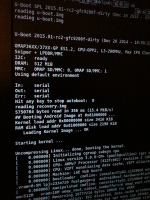A hacker's journey: freeing a phone from the ground up, fourth part
Written by Paul Kocialkowski 5 commentsThat whole I2C issue took me close to two months to resolve. As I recall, probing finally worked on my last day of summer vacation. I was so happy to finally have figured the issue out, that over the next week or so, I cleaned-up the X-Loader code and got it to a state where it could load LK (the only working second-stage bootloader binary I had at disposal) from the external sdcard.
U-Boot
A few months went by, I started working on other things, like Allwinner devices, on my ever-shrinking amount of spare time. At some point, I decided I needed to get back to it and properly port U-Boot. Of course, we're talking about upstream U-Boot here, as I'm not a big fan of either fighting with the code LG released (that is old, poorly written and contains a lot of dead code) or adapting versions of U-Boot code coming from TI. Working with upstream has countless advantages, among which I see an opportunity to get familiar with the current state of the U-Boot code as well as going through the process of having my code reviewed by peers, which is always a very enriching experience. It ensures that code is written the right way, fits well in the overall design and doesn't break something else. The temptation of doing easy and nasty changes to suit our case better is big when working on our own personal fork of such a big project and that's exactly what I wanted to avoid. Finally, having the phone in my pocked supported by upstream is pretty cool, right?
As I first dig into the U-Boot code, it struck me that an increasing number of devices are using the U-Boot SPL as a first stage loader. The U-Boot SPL is a minimalistic build of U-Boot that only contains the minimal amount of code to be able to chainload the usual and complete U-Boot binary. There is SPL support for the OMAP3, so I thought I might as well give it a try, since X-Loader is an old copy of deprecated U-Boot code anyways. It didn't take me long to get it to run, with the usual base address correction due to the fact that I'm using peripheral booting. I will most certainly drop X-Loader and go with U-Boot and the U-Boot SPL for the future.
Current status and overlook of the future

U-Boot runningTo this day, I have submitted a handful of patches upstream to add support for various features that I need for the P970 (named sniper in the code) and most of those were accepted already. The rest of it is available on my personal git repository for the Optimus Black (P970) codename sniper's U-Boot port. I am still working on getting board support ready with a certain amount of features, like fastboot support (including eMMC flashing) and being able to get the SPL to boot U-Boot from the external sdcard on demand, to allow failsafe U-Boot development without having to unsolder a resistor.
A few others things are needed in order to be able to load and run kernels painlessly: currently, booting Linux is working but a few features appear to be broken.
The next steps in this journey are the following: getting board support ready and accepted in upstream U-Boot and then starting the Replicant port. It shouldn't be too much work to get Replicant running on the device, so I'm confident it will come around. Of course, I will properly document the device on the Replicant wiki at some point in the near future. I am also hoping to talk about this device at FOSDEM this year, among other exciting new things that I've been doing recently.
And once upstream U-Boot support is merged, why stop there? I could just as well try and get some Linux support for it upstream: that could be an interesting and challenging task, despite not being crucial for software freedom. And of course, once everything is properly documented, everyone is welcome to join in and help!
Finally, during all this, I've come to learn about a few other mainstream OMAP GP devices (that I will also document at some point), such as the first generation Kindle Fire from Amazon, which is really likely to become my next target for Replicant after the Optimus Black. Thanks to the great work already achieved by developer Hashcode, there is already an U-Boot port available, and instructions on how to get UART from the device are also available!
Conclusion
Overall, I'm definitely very happy with the way this whole experience went. It most certainly brought me a lot regarding how low-level initialization and bootloaders work and hopefully offered me a chance to make a real difference for those of us who care about having free bootloaders running on the devices in our pockets, in addition to a free system. The odds also seem to be in our favor when it comes to modem isolation, so the whole device is pretty close to being “as good as it gets” today. To be fair, everything is not exactly great about it: graphics acceleration and 3D will still be proprietary, the GPS protocol is still unknown and the video decoding unit (DSP) as well as Wi-Fi and bluetooth require loaded proprietary firmwares.
As a final word, I'd like to thank whoever decided to go with the GP version of the OMAP3630 at LG. Heck, that decision brought me the hell of a ride!
This post is part of a series of articles about freeing the LG Optimus Black (P970):